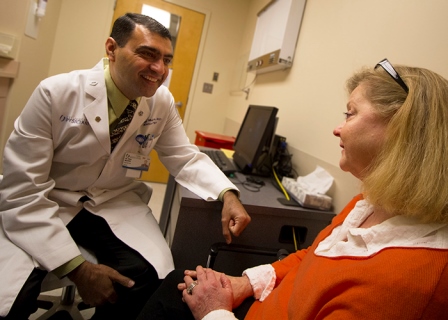Working Across All Levels to Educate Future Doctors and Rheumatologists
 Vikas Majithia, MD, MPH, is an associate professor of medicine, director of the Division of Rheumatology and the rheumatology fellowship program director at the University of Mississippi Medical Center (UMMC). In this leadership role, he interacts with medical students, residents and fellows each day. As a recipient of several Amgen Fellowship Training Awards, he uses his support from the Rheumatology Research Foundation to develop a strong and capable workforce to care for people with rheumatic disease.
Vikas Majithia, MD, MPH, is an associate professor of medicine, director of the Division of Rheumatology and the rheumatology fellowship program director at the University of Mississippi Medical Center (UMMC). In this leadership role, he interacts with medical students, residents and fellows each day. As a recipient of several Amgen Fellowship Training Awards, he uses his support from the Rheumatology Research Foundation to develop a strong and capable workforce to care for people with rheumatic disease.
What’s the most rewarding part of your job?
“For me personally, it’s the relationships I’m able to develop with my patients but secondly, it’s the ability to teach. I absolutely love the relationships I have with trainees, and I’m really blessed to work with trainees at all levels. “
Tell us about who you work with.
Dr. Majithia often gives students at UMMC their initial exposure to rheumatology in the classroom, delivering a lecture each year on a particular rheumatic disease to medical students in their second year of study. Many residents and fellows continue their training at UMMC cite his introduction to rheumatology as a key moment in their education. Dr. Majithia also works with third- and fourth-year medical students throughout their training in the hospital. “I also work with residents and fellows of course,” says Dr. Majithia, but with his new role as division director, he works closely with junior faculty and some graduate research students.
Why is mentorship so important?
Although Dr. Majithia acknowledges a need for more rheumatologists nationally, he is quick to cite the value of continued mentorship. “Mentorship in rheumatology is extremely important because we have to continue developing a strong pipeline of new rheumatologists.”
How does the Rheumatology Research Foundation support a strong and capable workforce?
“The Foundation is an extremely big driver of improving the access to care,” says Dr. Majithia. By having awards at each level of training, they encourage interest in the field among medical students and residents, and provide support for rheumatologists-in-training during their fellowships. “By increasing the number of people available to care for patients, we directly impact patients’ lives.”